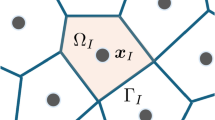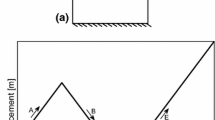Abstract
The main feature of partition of unity methods such as the generalized or extended finite element method is their ability of utilizing a priori knowledge about the solution of a problem in the form of enrichment functions. However, analytical derivation of enrichment functions with good approximation properties is mostly limited to two-dimensional linear problems. This paper presents a procedure to numerically generate proper enrichment functions for three-dimensional problems with confined plasticity where plastic evolution is gradual. This procedure involves the solution of boundary value problems around local regions exhibiting nonlinear behavior and the enrichment of the global solution space with the local solutions through the partition of unity method framework. This approach can produce accurate nonlinear solutions with a reduced computational cost compared to standard finite element methods since computationally intensive nonlinear iterations can be performed on coarse global meshes after the creation of enrichment functions properly describing localized nonlinear behavior. Several three-dimensional nonlinear problems based on the rate-independent J 2 plasticity theory with isotropic hardening are solved using the proposed procedure to demonstrate its robustness, accuracy and computational efficiency.
Similar content being viewed by others
References
ANSYS (2010) User’s manual. ANSYS Inc, USA
Babuška I, Melenk JM (1997) The partition of unity method. Int J Numer Methods Eng 40: 727–758
Babuška I, Banerjee U, Osborn JE (2004) Generalized finite element methods—main ideas, results and perspective. Int J Comput Methods 1(1): 67–103
Barros FB, Proenca SPB, Barcellos CS (2004) Generalized finite element method in structural nonlinear analysis: a p-adaptive strategy. Comput Mech 33: 95–107
Belytschko T, Black T (1999) Elastic crack growth in finite elements with minimal remeshing. Int J Numer Methods Eng 45: 601–620
Belytschko T, Moës N, Usui S, Parimi C (2001) Arbitrary discontinuities in finite elements. Int J Numer Methods Eng 50: 993–1013
Bonnet M, Mukherjee S (1996) Implicit BEM formulations for usual and sensitivity problems in elastoplasticity using the consistent tangent operator concept. Int J Solids Struct 33: 4461–4480
Duarte CA, Kim D-J (2008) Analysis and applications of a generalized finite element method with global-local enrichment functions. Comput Methods Appl Mech Eng 197(6-8): 487–504
Duarte CAM, Oden JT (1996) An hp adaptive method using clouds. Comput Methods Appl Mech Eng 139: 237–262
Duarte CA, Babuška I, Oden JT (2000) Generalized finite element methods for three dimensional structural mechanics problems. Comput Struct 77: 215–232
Duarte CA, Kim D-J, Quaresma DM (2006) Arbitrarily smooth generalized finite element approximations. Comput Methods Appl Mech Eng 196: 33–56
Düster A, Rank E (2002) A p-version finite element approach for two- and three-dimensional problems of the j 2 flow theory with non-linear isotropic hardening. Int J Numer Methods Eng 53: 49–63
Elguedj T, Gravouil A, Combescure A (2006) Appropriate extended functions for the X-FEM simulation of plastic fracture mechanics. Comput Methods Appl Mech Eng 195: 501–515
Elguedj TT, Gravouil A, Combescure A (2007) A mixed augmented lagrangian-extended finite element method for modelling elastic-plastic fatigue crack growth with unilateral contact. Int J Numer Methods Eng 71: 1569–1597
Galland F, Gravouil A, Malvesin E, Rochette M (2011) A global model reduction approach for 3D fatigue crack growth with confined plasticity. Comput Methods Appl Mech Eng 200: 699–716
Kim D-J, Duarte CA, Pereira JP (2008) Analysis of interacting cracks using the generalized finite element method with global-local enrichment functions. J Appl Mech 75(5): 051107
Kim D-J, Pereira JP, Duarte CA (2010) Analysis of three-dimensional fracture mechanics problems: a two-scale approach using coarse generalized FEM meshes. Int J Numer Methods Eng 81(3): 335–365
Kim D-J, Duarte CA, Sobh NA (2011) Parallel simulations of three-dimensional cracks using the generalized finite element method. Comput Mech 47(3): 265–282
Moës N, Dolbow J, Belytschko T (1999) A finite element method for crack growth without remeshing. Int J Numer Methods Eng 46: 131–150
Oden JT, Duarte CAM (1996) Chapter: solution of singular problems using hp clouds. In Whiteman JR (ed) The mathematics of finite elements and applications—highlights. John Wiley & Sons, New York, pp 35–54, http://citeseer.ist.psu.edu/170015.html
Oden JT, Duarte CA, Zienkiewicz OC (1998) A new cloud-based hp finite element method. Comput Methods Appl Mech Eng 153: 117–126
Pierres E, Baietto MC, Gravouil A (2010) A two-scale extended finite element method for modelling 3D crack growth with interfacial contact. Comput Methods Appl Mech Eng 199: 1165–1177. doi:10.1016/j.cma.2009.12.006
Prabel B, Combescure A, Gravouil A, Marie S (2007) Level set X-FEM non-matching meshes: application to dynamic crack propagation in elastic-plastic media. Int J Numer Methods Eng 69: 1553–1569
Rao BN, Rahman S (2004) An enriched meshless method for non-linear fracture mechanics. Int J Numer Methods Eng 59: 197–223
Simo JC, Hughes TJR (1998) Computational inelasticity. Springer, New York ISBN: 0-387-97520-9
Simo JC, Taylor RL (1985) Consistent tangent operators for rate-independent elastoplasticity. Int J Numer Methods Eng 48: 101–118
Simone A, Duarte CA, van der Giessen E (2006) A generalized finite element method for polycrystals with discontinuous grain boundaries. Int J Numer Methods Eng 67(8): 1122–1145
Strouboulis T, Copps K, Babuška I (2001) The generalized finite element method. Comput Methods Appl Mech Eng 190: 4081–4193
Sukumar N, Moës N, Moran B, Belytschko T (2000) Extended finite element method for three-dimensional crack modelling. Int J Numer Methods Eng 48(11): 1549–1570
Sukumar N, Chopp D, Moës N, Belytschko T (2001) Modeling holes and inclusions by level sets in the extended finite element method. Comput Methods Appl Mech Eng 190: 6183–6200
Torres IR, Proenca SPB (2008) Generalized finite element method in nonlinear three-dimensional analysis. Int J Comput Methods 5: 37–62
Author information
Authors and Affiliations
Corresponding author
Rights and permissions
About this article
Cite this article
Kim, DJ., Duarte, C.A. & Proenca, S.P. A generalized finite element method with global-local enrichment functions for confined plasticity problems. Comput Mech 50, 563–578 (2012). https://doi.org/10.1007/s00466-012-0689-7
Received:
Accepted:
Published:
Issue Date:
DOI: https://doi.org/10.1007/s00466-012-0689-7




